Motorbikes Pty Ltd and Cakes Pty Ltd: Contractual Agreement Analysis
VerifiedAdded on 2021/06/15
|7
|1818
|45
Homework Assignment
AI Summary
This assignment delves into the intricacies of company law, specifically examining contractual agreements within the framework of the Corporations Act 2001. The assignment addresses two key scenarios: firstly, whether Motorbikes Pty Ltd is bound by a contract made by its director and secretary, analyzing the authorities of company agents and the legal implications of their actions. Secondly, the assignment investigates whether George can cancel a contract made by Gerard and Sylvia on behalf of Cakes Pty Ltd, focusing on the application of assumptions under section 129 of the Act and the validity of contracts signed by company officers. The analysis incorporates relevant case law, including Salomon v. A. Salomon & Co. Ltd, Hely-Hutchinson v Brayhead Ltd, and Panorama Developments (Guildford) Ltd v Fidelis Furnishing Fabrics Ltd, to determine the binding nature of the contracts and the rights and obligations of the parties involved. The assignment concludes with reasoned legal arguments supporting the conclusions reached for each case, emphasizing the importance of understanding the legal personality of companies, the authority of directors and secretaries, and the protections afforded to outsiders dealing with companies.
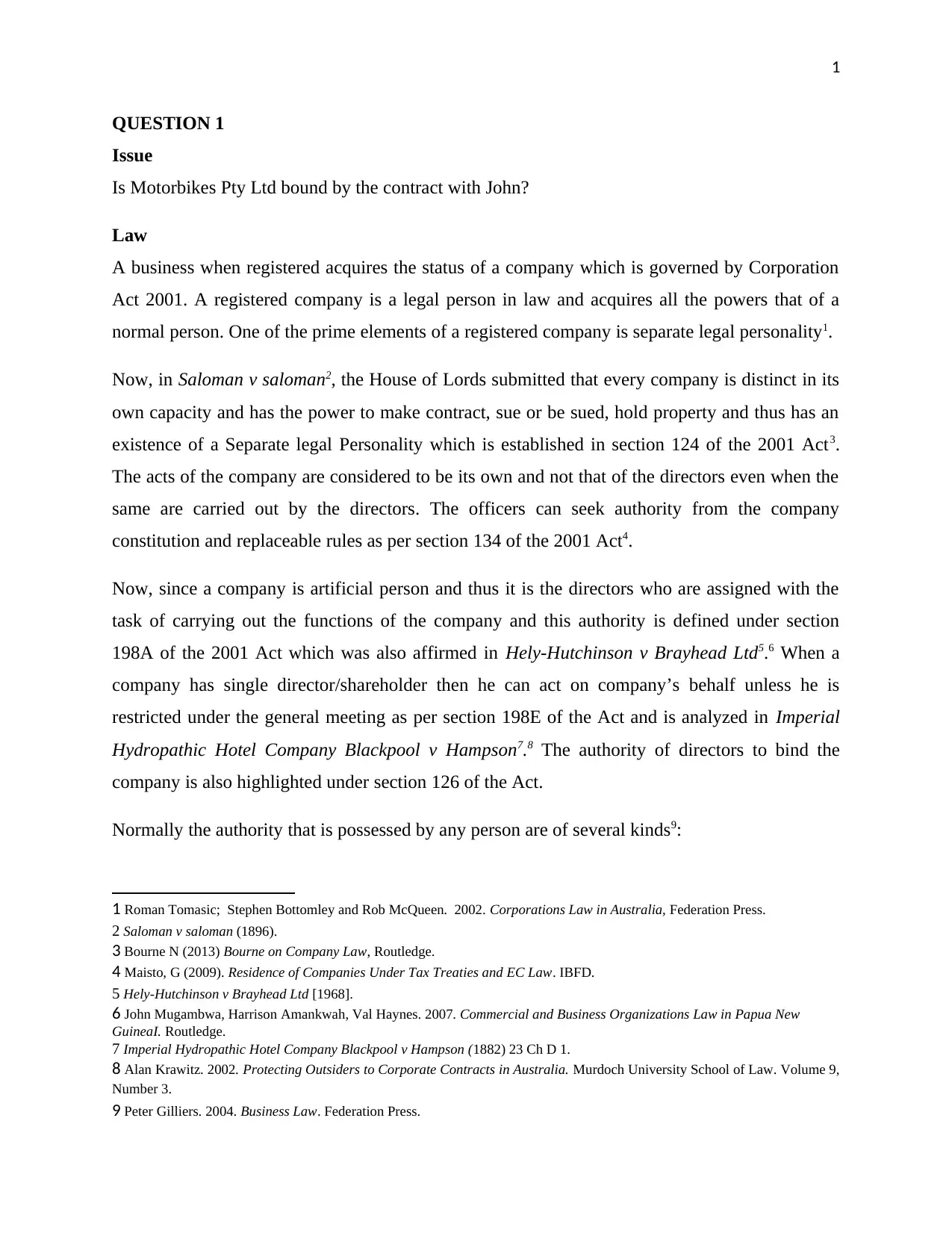
1
QUESTION 1
Issue
Is Motorbikes Pty Ltd bound by the contract with John?
Law
A business when registered acquires the status of a company which is governed by Corporation
Act 2001. A registered company is a legal person in law and acquires all the powers that of a
normal person. One of the prime elements of a registered company is separate legal personality1.
Now, in Saloman v saloman2, the House of Lords submitted that every company is distinct in its
own capacity and has the power to make contract, sue or be sued, hold property and thus has an
existence of a Separate legal Personality which is established in section 124 of the 2001 Act3.
The acts of the company are considered to be its own and not that of the directors even when the
same are carried out by the directors. The officers can seek authority from the company
constitution and replaceable rules as per section 134 of the 2001 Act4.
Now, since a company is artificial person and thus it is the directors who are assigned with the
task of carrying out the functions of the company and this authority is defined under section
198A of the 2001 Act which was also affirmed in Hely-Hutchinson v Brayhead Ltd5.6 When a
company has single director/shareholder then he can act on company’s behalf unless he is
restricted under the general meeting as per section 198E of the Act and is analyzed in Imperial
Hydropathic Hotel Company Blackpool v Hampson7.8 The authority of directors to bind the
company is also highlighted under section 126 of the Act.
Normally the authority that is possessed by any person are of several kinds9:
1 Roman Tomasic; Stephen Bottomley and Rob McQueen. 2002. Corporations Law in Australia, Federation Press.
2 Saloman v saloman (1896).
3 Bourne N (2013) Bourne on Company Law, Routledge.
4 Maisto, G (2009). Residence of Companies Under Tax Treaties and EC Law. IBFD.
5 Hely-Hutchinson v Brayhead Ltd [1968].
6 John Mugambwa, Harrison Amankwah, Val Haynes. 2007. Commercial and Business Organizations Law in Papua New
GuineaI. Routledge.
7 Imperial Hydropathic Hotel Company Blackpool v Hampson (1882) 23 Ch D 1.
8 Alan Krawitz. 2002. Protecting Outsiders to Corporate Contracts in Australia. Murdoch University School of Law. Volume 9,
Number 3.
9 Peter Gilliers. 2004. Business Law. Federation Press.
QUESTION 1
Issue
Is Motorbikes Pty Ltd bound by the contract with John?
Law
A business when registered acquires the status of a company which is governed by Corporation
Act 2001. A registered company is a legal person in law and acquires all the powers that of a
normal person. One of the prime elements of a registered company is separate legal personality1.
Now, in Saloman v saloman2, the House of Lords submitted that every company is distinct in its
own capacity and has the power to make contract, sue or be sued, hold property and thus has an
existence of a Separate legal Personality which is established in section 124 of the 2001 Act3.
The acts of the company are considered to be its own and not that of the directors even when the
same are carried out by the directors. The officers can seek authority from the company
constitution and replaceable rules as per section 134 of the 2001 Act4.
Now, since a company is artificial person and thus it is the directors who are assigned with the
task of carrying out the functions of the company and this authority is defined under section
198A of the 2001 Act which was also affirmed in Hely-Hutchinson v Brayhead Ltd5.6 When a
company has single director/shareholder then he can act on company’s behalf unless he is
restricted under the general meeting as per section 198E of the Act and is analyzed in Imperial
Hydropathic Hotel Company Blackpool v Hampson7.8 The authority of directors to bind the
company is also highlighted under section 126 of the Act.
Normally the authority that is possessed by any person are of several kinds9:
1 Roman Tomasic; Stephen Bottomley and Rob McQueen. 2002. Corporations Law in Australia, Federation Press.
2 Saloman v saloman (1896).
3 Bourne N (2013) Bourne on Company Law, Routledge.
4 Maisto, G (2009). Residence of Companies Under Tax Treaties and EC Law. IBFD.
5 Hely-Hutchinson v Brayhead Ltd [1968].
6 John Mugambwa, Harrison Amankwah, Val Haynes. 2007. Commercial and Business Organizations Law in Papua New
GuineaI. Routledge.
7 Imperial Hydropathic Hotel Company Blackpool v Hampson (1882) 23 Ch D 1.
8 Alan Krawitz. 2002. Protecting Outsiders to Corporate Contracts in Australia. Murdoch University School of Law. Volume 9,
Number 3.
9 Peter Gilliers. 2004. Business Law. Federation Press.
Paraphrase This Document
Need a fresh take? Get an instant paraphrase of this document with our AI Paraphraser
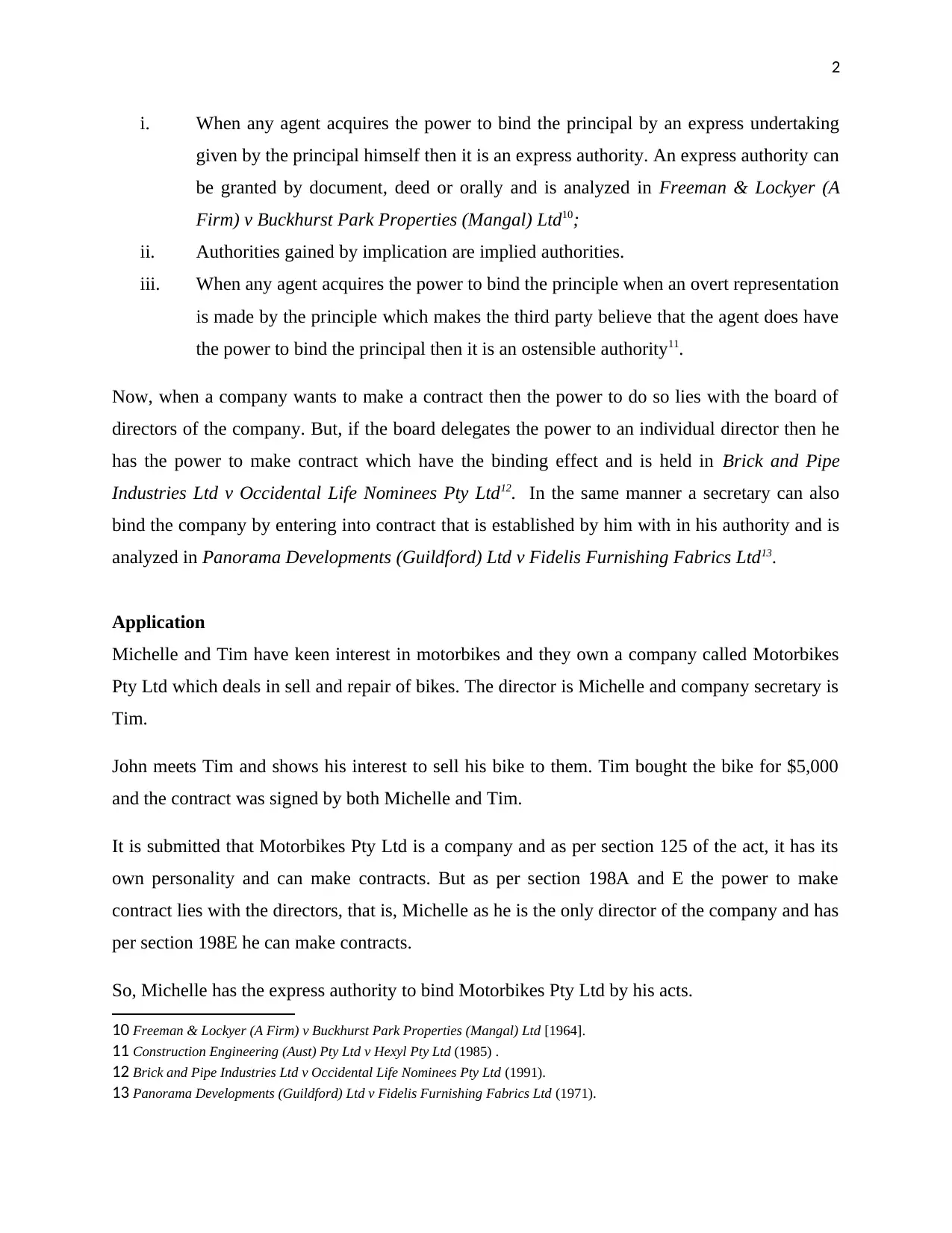
2
i. When any agent acquires the power to bind the principal by an express undertaking
given by the principal himself then it is an express authority. An express authority can
be granted by document, deed or orally and is analyzed in Freeman & Lockyer (A
Firm) v Buckhurst Park Properties (Mangal) Ltd10;
ii. Authorities gained by implication are implied authorities.
iii. When any agent acquires the power to bind the principle when an overt representation
is made by the principle which makes the third party believe that the agent does have
the power to bind the principal then it is an ostensible authority11.
Now, when a company wants to make a contract then the power to do so lies with the board of
directors of the company. But, if the board delegates the power to an individual director then he
has the power to make contract which have the binding effect and is held in Brick and Pipe
Industries Ltd v Occidental Life Nominees Pty Ltd12. In the same manner a secretary can also
bind the company by entering into contract that is established by him with in his authority and is
analyzed in Panorama Developments (Guildford) Ltd v Fidelis Furnishing Fabrics Ltd13.
Application
Michelle and Tim have keen interest in motorbikes and they own a company called Motorbikes
Pty Ltd which deals in sell and repair of bikes. The director is Michelle and company secretary is
Tim.
John meets Tim and shows his interest to sell his bike to them. Tim bought the bike for $5,000
and the contract was signed by both Michelle and Tim.
It is submitted that Motorbikes Pty Ltd is a company and as per section 125 of the act, it has its
own personality and can make contracts. But as per section 198A and E the power to make
contract lies with the directors, that is, Michelle as he is the only director of the company and has
per section 198E he can make contracts.
So, Michelle has the express authority to bind Motorbikes Pty Ltd by his acts.
10 Freeman & Lockyer (A Firm) v Buckhurst Park Properties (Mangal) Ltd [1964].
11 Construction Engineering (Aust) Pty Ltd v Hexyl Pty Ltd (1985) .
12 Brick and Pipe Industries Ltd v Occidental Life Nominees Pty Ltd (1991).
13 Panorama Developments (Guildford) Ltd v Fidelis Furnishing Fabrics Ltd (1971).
i. When any agent acquires the power to bind the principal by an express undertaking
given by the principal himself then it is an express authority. An express authority can
be granted by document, deed or orally and is analyzed in Freeman & Lockyer (A
Firm) v Buckhurst Park Properties (Mangal) Ltd10;
ii. Authorities gained by implication are implied authorities.
iii. When any agent acquires the power to bind the principle when an overt representation
is made by the principle which makes the third party believe that the agent does have
the power to bind the principal then it is an ostensible authority11.
Now, when a company wants to make a contract then the power to do so lies with the board of
directors of the company. But, if the board delegates the power to an individual director then he
has the power to make contract which have the binding effect and is held in Brick and Pipe
Industries Ltd v Occidental Life Nominees Pty Ltd12. In the same manner a secretary can also
bind the company by entering into contract that is established by him with in his authority and is
analyzed in Panorama Developments (Guildford) Ltd v Fidelis Furnishing Fabrics Ltd13.
Application
Michelle and Tim have keen interest in motorbikes and they own a company called Motorbikes
Pty Ltd which deals in sell and repair of bikes. The director is Michelle and company secretary is
Tim.
John meets Tim and shows his interest to sell his bike to them. Tim bought the bike for $5,000
and the contract was signed by both Michelle and Tim.
It is submitted that Motorbikes Pty Ltd is a company and as per section 125 of the act, it has its
own personality and can make contracts. But as per section 198A and E the power to make
contract lies with the directors, that is, Michelle as he is the only director of the company and has
per section 198E he can make contracts.
So, Michelle has the express authority to bind Motorbikes Pty Ltd by his acts.
10 Freeman & Lockyer (A Firm) v Buckhurst Park Properties (Mangal) Ltd [1964].
11 Construction Engineering (Aust) Pty Ltd v Hexyl Pty Ltd (1985) .
12 Brick and Pipe Industries Ltd v Occidental Life Nominees Pty Ltd (1991).
13 Panorama Developments (Guildford) Ltd v Fidelis Furnishing Fabrics Ltd (1971).
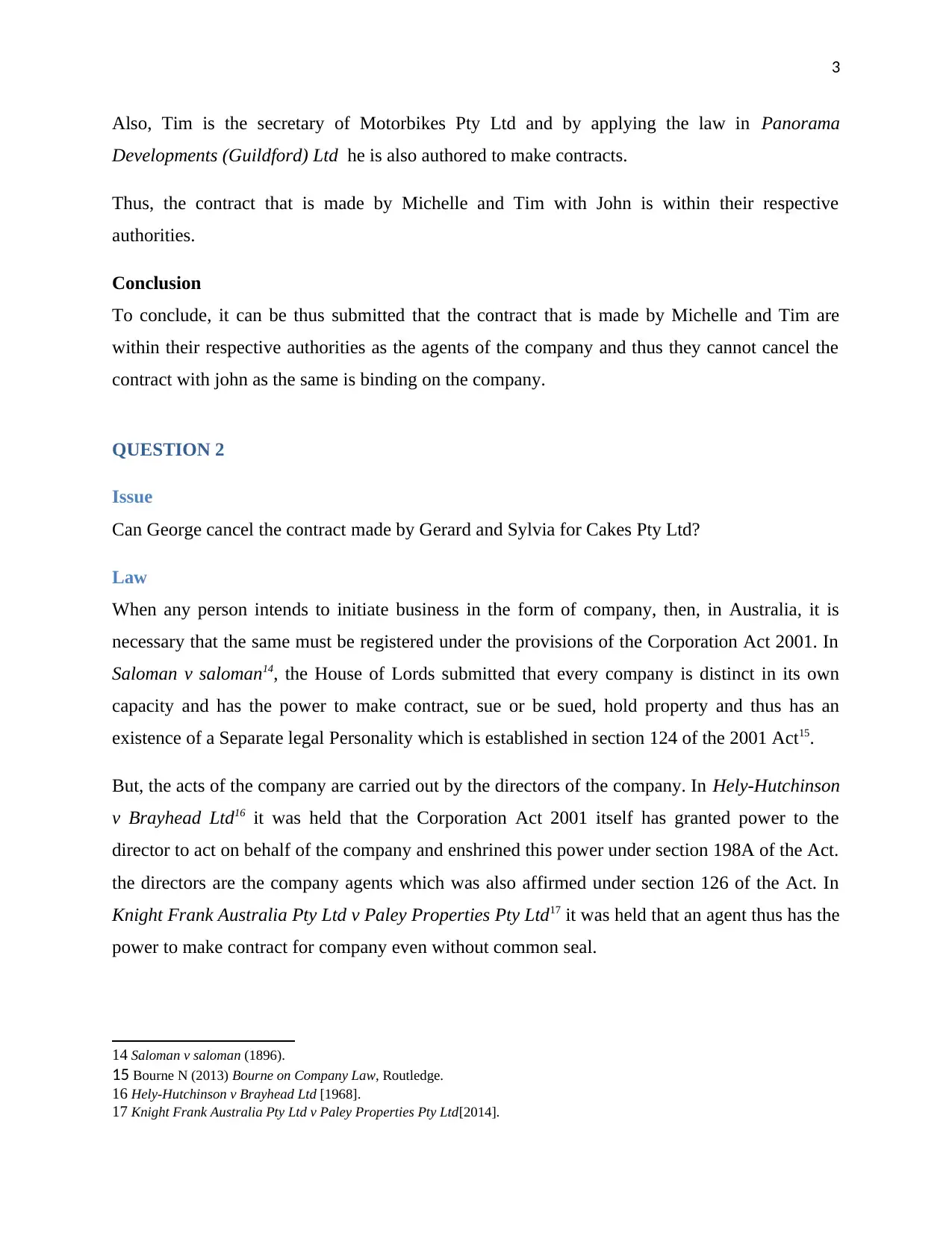
3
Also, Tim is the secretary of Motorbikes Pty Ltd and by applying the law in Panorama
Developments (Guildford) Ltd he is also authored to make contracts.
Thus, the contract that is made by Michelle and Tim with John is within their respective
authorities.
Conclusion
To conclude, it can be thus submitted that the contract that is made by Michelle and Tim are
within their respective authorities as the agents of the company and thus they cannot cancel the
contract with john as the same is binding on the company.
QUESTION 2
Issue
Can George cancel the contract made by Gerard and Sylvia for Cakes Pty Ltd?
Law
When any person intends to initiate business in the form of company, then, in Australia, it is
necessary that the same must be registered under the provisions of the Corporation Act 2001. In
Saloman v saloman14, the House of Lords submitted that every company is distinct in its own
capacity and has the power to make contract, sue or be sued, hold property and thus has an
existence of a Separate legal Personality which is established in section 124 of the 2001 Act15.
But, the acts of the company are carried out by the directors of the company. In Hely-Hutchinson
v Brayhead Ltd16 it was held that the Corporation Act 2001 itself has granted power to the
director to act on behalf of the company and enshrined this power under section 198A of the Act.
the directors are the company agents which was also affirmed under section 126 of the Act. In
Knight Frank Australia Pty Ltd v Paley Properties Pty Ltd17 it was held that an agent thus has the
power to make contract for company even without common seal.
14 Saloman v saloman (1896).
15 Bourne N (2013) Bourne on Company Law, Routledge.
16 Hely-Hutchinson v Brayhead Ltd [1968].
17 Knight Frank Australia Pty Ltd v Paley Properties Pty Ltd[2014].
Also, Tim is the secretary of Motorbikes Pty Ltd and by applying the law in Panorama
Developments (Guildford) Ltd he is also authored to make contracts.
Thus, the contract that is made by Michelle and Tim with John is within their respective
authorities.
Conclusion
To conclude, it can be thus submitted that the contract that is made by Michelle and Tim are
within their respective authorities as the agents of the company and thus they cannot cancel the
contract with john as the same is binding on the company.
QUESTION 2
Issue
Can George cancel the contract made by Gerard and Sylvia for Cakes Pty Ltd?
Law
When any person intends to initiate business in the form of company, then, in Australia, it is
necessary that the same must be registered under the provisions of the Corporation Act 2001. In
Saloman v saloman14, the House of Lords submitted that every company is distinct in its own
capacity and has the power to make contract, sue or be sued, hold property and thus has an
existence of a Separate legal Personality which is established in section 124 of the 2001 Act15.
But, the acts of the company are carried out by the directors of the company. In Hely-Hutchinson
v Brayhead Ltd16 it was held that the Corporation Act 2001 itself has granted power to the
director to act on behalf of the company and enshrined this power under section 198A of the Act.
the directors are the company agents which was also affirmed under section 126 of the Act. In
Knight Frank Australia Pty Ltd v Paley Properties Pty Ltd17 it was held that an agent thus has the
power to make contract for company even without common seal.
14 Saloman v saloman (1896).
15 Bourne N (2013) Bourne on Company Law, Routledge.
16 Hely-Hutchinson v Brayhead Ltd [1968].
17 Knight Frank Australia Pty Ltd v Paley Properties Pty Ltd[2014].
⊘ This is a preview!⊘
Do you want full access?
Subscribe today to unlock all pages.

Trusted by 1+ million students worldwide
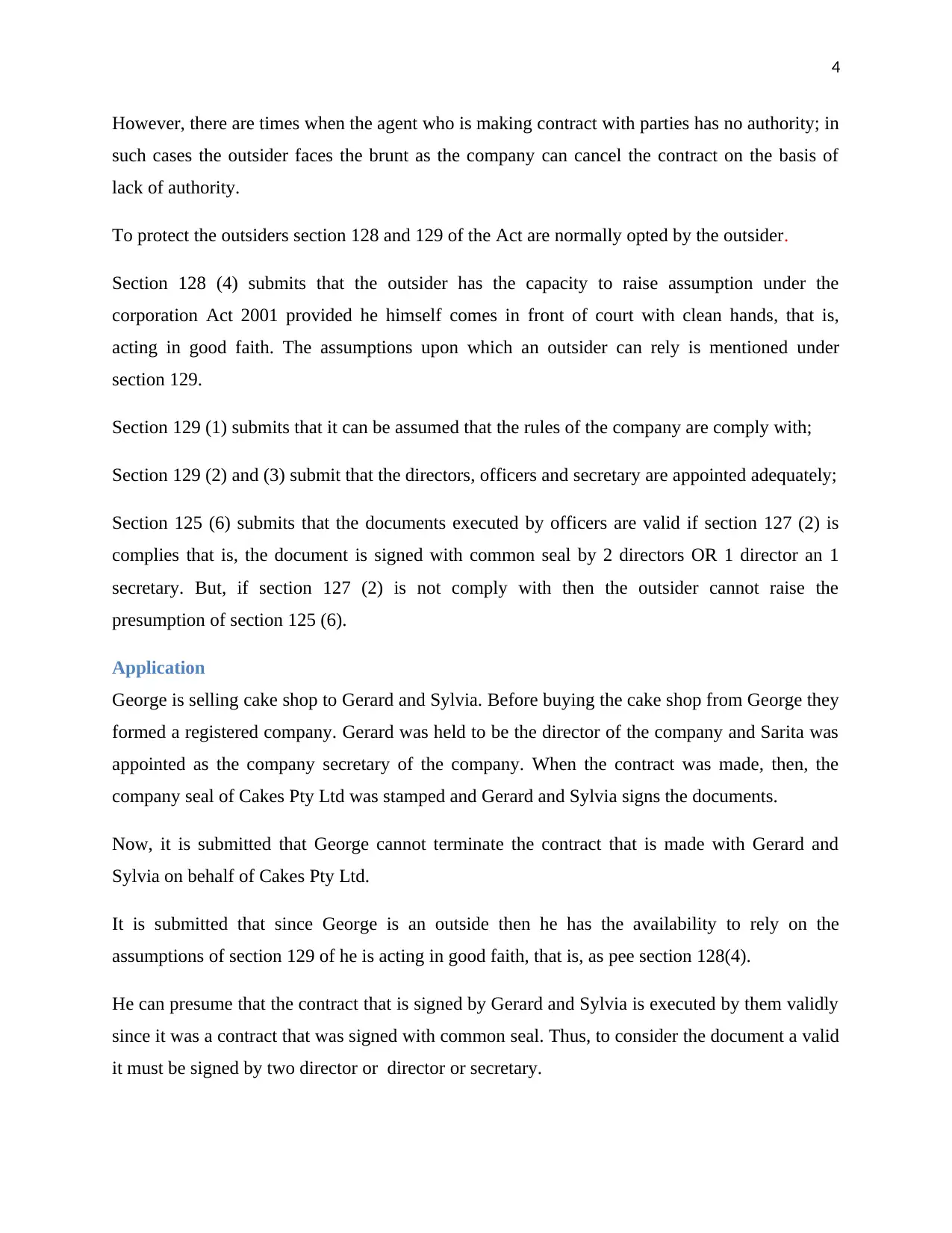
4
However, there are times when the agent who is making contract with parties has no authority; in
such cases the outsider faces the brunt as the company can cancel the contract on the basis of
lack of authority.
To protect the outsiders section 128 and 129 of the Act are normally opted by the outsider.
Section 128 (4) submits that the outsider has the capacity to raise assumption under the
corporation Act 2001 provided he himself comes in front of court with clean hands, that is,
acting in good faith. The assumptions upon which an outsider can rely is mentioned under
section 129.
Section 129 (1) submits that it can be assumed that the rules of the company are comply with;
Section 129 (2) and (3) submit that the directors, officers and secretary are appointed adequately;
Section 125 (6) submits that the documents executed by officers are valid if section 127 (2) is
complies that is, the document is signed with common seal by 2 directors OR 1 director an 1
secretary. But, if section 127 (2) is not comply with then the outsider cannot raise the
presumption of section 125 (6).
Application
George is selling cake shop to Gerard and Sylvia. Before buying the cake shop from George they
formed a registered company. Gerard was held to be the director of the company and Sarita was
appointed as the company secretary of the company. When the contract was made, then, the
company seal of Cakes Pty Ltd was stamped and Gerard and Sylvia signs the documents.
Now, it is submitted that George cannot terminate the contract that is made with Gerard and
Sylvia on behalf of Cakes Pty Ltd.
It is submitted that since George is an outside then he has the availability to rely on the
assumptions of section 129 of he is acting in good faith, that is, as pee section 128(4).
He can presume that the contract that is signed by Gerard and Sylvia is executed by them validly
since it was a contract that was signed with common seal. Thus, to consider the document a valid
it must be signed by two director or director or secretary.
However, there are times when the agent who is making contract with parties has no authority; in
such cases the outsider faces the brunt as the company can cancel the contract on the basis of
lack of authority.
To protect the outsiders section 128 and 129 of the Act are normally opted by the outsider.
Section 128 (4) submits that the outsider has the capacity to raise assumption under the
corporation Act 2001 provided he himself comes in front of court with clean hands, that is,
acting in good faith. The assumptions upon which an outsider can rely is mentioned under
section 129.
Section 129 (1) submits that it can be assumed that the rules of the company are comply with;
Section 129 (2) and (3) submit that the directors, officers and secretary are appointed adequately;
Section 125 (6) submits that the documents executed by officers are valid if section 127 (2) is
complies that is, the document is signed with common seal by 2 directors OR 1 director an 1
secretary. But, if section 127 (2) is not comply with then the outsider cannot raise the
presumption of section 125 (6).
Application
George is selling cake shop to Gerard and Sylvia. Before buying the cake shop from George they
formed a registered company. Gerard was held to be the director of the company and Sarita was
appointed as the company secretary of the company. When the contract was made, then, the
company seal of Cakes Pty Ltd was stamped and Gerard and Sylvia signs the documents.
Now, it is submitted that George cannot terminate the contract that is made with Gerard and
Sylvia on behalf of Cakes Pty Ltd.
It is submitted that since George is an outside then he has the availability to rely on the
assumptions of section 129 of he is acting in good faith, that is, as pee section 128(4).
He can presume that the contract that is signed by Gerard and Sylvia is executed by them validly
since it was a contract that was signed with common seal. Thus, to consider the document a valid
it must be signed by two director or director or secretary.
Paraphrase This Document
Need a fresh take? Get an instant paraphrase of this document with our AI Paraphraser
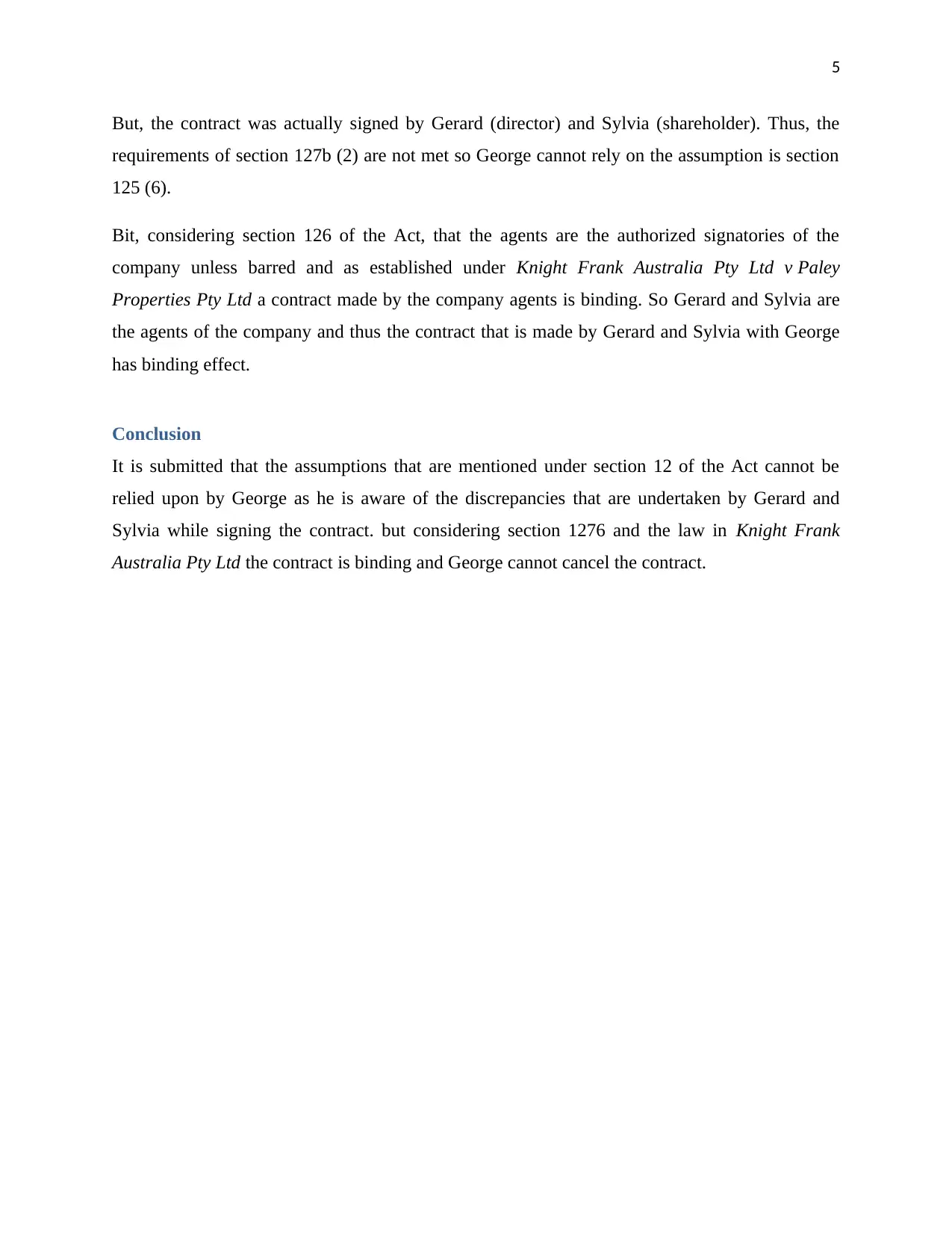
5
But, the contract was actually signed by Gerard (director) and Sylvia (shareholder). Thus, the
requirements of section 127b (2) are not met so George cannot rely on the assumption is section
125 (6).
Bit, considering section 126 of the Act, that the agents are the authorized signatories of the
company unless barred and as established under Knight Frank Australia Pty Ltd v Paley
Properties Pty Ltd a contract made by the company agents is binding. So Gerard and Sylvia are
the agents of the company and thus the contract that is made by Gerard and Sylvia with George
has binding effect.
Conclusion
It is submitted that the assumptions that are mentioned under section 12 of the Act cannot be
relied upon by George as he is aware of the discrepancies that are undertaken by Gerard and
Sylvia while signing the contract. but considering section 1276 and the law in Knight Frank
Australia Pty Ltd the contract is binding and George cannot cancel the contract.
But, the contract was actually signed by Gerard (director) and Sylvia (shareholder). Thus, the
requirements of section 127b (2) are not met so George cannot rely on the assumption is section
125 (6).
Bit, considering section 126 of the Act, that the agents are the authorized signatories of the
company unless barred and as established under Knight Frank Australia Pty Ltd v Paley
Properties Pty Ltd a contract made by the company agents is binding. So Gerard and Sylvia are
the agents of the company and thus the contract that is made by Gerard and Sylvia with George
has binding effect.
Conclusion
It is submitted that the assumptions that are mentioned under section 12 of the Act cannot be
relied upon by George as he is aware of the discrepancies that are undertaken by Gerard and
Sylvia while signing the contract. but considering section 1276 and the law in Knight Frank
Australia Pty Ltd the contract is binding and George cannot cancel the contract.
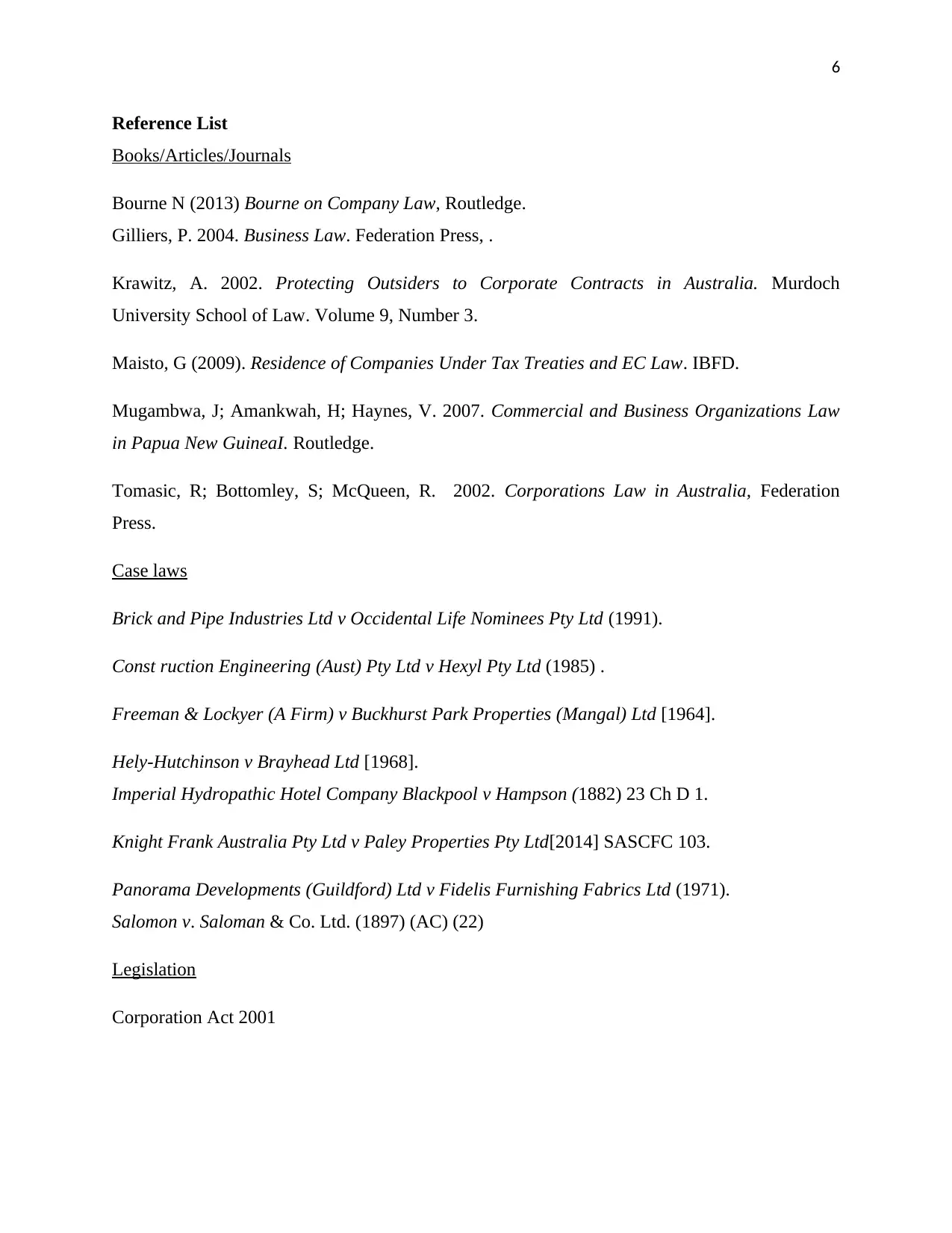
6
Reference List
Books/Articles/Journals
Bourne N (2013) Bourne on Company Law, Routledge.
Gilliers, P. 2004. Business Law. Federation Press, .
Krawitz, A. 2002. Protecting Outsiders to Corporate Contracts in Australia. Murdoch
University School of Law. Volume 9, Number 3.
Maisto, G (2009). Residence of Companies Under Tax Treaties and EC Law. IBFD.
Mugambwa, J; Amankwah, H; Haynes, V. 2007. Commercial and Business Organizations Law
in Papua New GuineaI. Routledge.
Tomasic, R; Bottomley, S; McQueen, R. 2002. Corporations Law in Australia, Federation
Press.
Case laws
Brick and Pipe Industries Ltd v Occidental Life Nominees Pty Ltd (1991).
Const ruction Engineering (Aust) Pty Ltd v Hexyl Pty Ltd (1985) .
Freeman & Lockyer (A Firm) v Buckhurst Park Properties (Mangal) Ltd [1964].
Hely-Hutchinson v Brayhead Ltd [1968].
Imperial Hydropathic Hotel Company Blackpool v Hampson (1882) 23 Ch D 1.
Knight Frank Australia Pty Ltd v Paley Properties Pty Ltd[2014] SASCFC 103.
Panorama Developments (Guildford) Ltd v Fidelis Furnishing Fabrics Ltd (1971).
Salomon v. Saloman & Co. Ltd. (1897) (AC) (22)
Legislation
Corporation Act 2001
Reference List
Books/Articles/Journals
Bourne N (2013) Bourne on Company Law, Routledge.
Gilliers, P. 2004. Business Law. Federation Press, .
Krawitz, A. 2002. Protecting Outsiders to Corporate Contracts in Australia. Murdoch
University School of Law. Volume 9, Number 3.
Maisto, G (2009). Residence of Companies Under Tax Treaties and EC Law. IBFD.
Mugambwa, J; Amankwah, H; Haynes, V. 2007. Commercial and Business Organizations Law
in Papua New GuineaI. Routledge.
Tomasic, R; Bottomley, S; McQueen, R. 2002. Corporations Law in Australia, Federation
Press.
Case laws
Brick and Pipe Industries Ltd v Occidental Life Nominees Pty Ltd (1991).
Const ruction Engineering (Aust) Pty Ltd v Hexyl Pty Ltd (1985) .
Freeman & Lockyer (A Firm) v Buckhurst Park Properties (Mangal) Ltd [1964].
Hely-Hutchinson v Brayhead Ltd [1968].
Imperial Hydropathic Hotel Company Blackpool v Hampson (1882) 23 Ch D 1.
Knight Frank Australia Pty Ltd v Paley Properties Pty Ltd[2014] SASCFC 103.
Panorama Developments (Guildford) Ltd v Fidelis Furnishing Fabrics Ltd (1971).
Salomon v. Saloman & Co. Ltd. (1897) (AC) (22)
Legislation
Corporation Act 2001
⊘ This is a preview!⊘
Do you want full access?
Subscribe today to unlock all pages.

Trusted by 1+ million students worldwide

7
1 out of 7
Related Documents
Your All-in-One AI-Powered Toolkit for Academic Success.
+13062052269
info@desklib.com
Available 24*7 on WhatsApp / Email
![[object Object]](/_next/static/media/star-bottom.7253800d.svg)
Unlock your academic potential
Copyright © 2020–2026 A2Z Services. All Rights Reserved. Developed and managed by ZUCOL.





